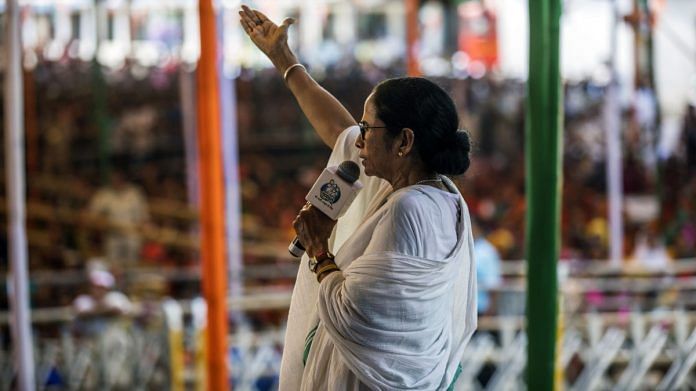
Mumbai: The Bharatiya Janata Party’s (BJP) loss in the West Bengal assembly election Sunday has boosted the spirits of the three-party Maha Vikas Aghadi (MVA), which is currently in power in Maharashtra.
This despite the latter losing its first assembly bypoll to the BJP the same day. The BJP’s Samadhan Autade won the Pandharpur-Mangalwedha assembly seat against MVA candidate Bhagirath Bhalke by a margin of 3,733 votes.
MVA leaders, however, said the loss was in no way a reflection on the performance of the coalition government, and chose instead to draw strength from the Trinamool Congress’ thumping victory against the BJP in Bengal. The Bengal election result, they said, showed that the BJP could not crush regional parties, no matter how aggressive its campaign.
According to the MVA, the Trinamool Congress’ win also showed that the one way to defeat the BJP at the national level was to bring this strength of regional forces and non-BJP parties together, and that gave the MVA — a similar experiment at the state level — more confidence.
The Mamata Banerjee-led Trinamool Congress defeated the BJP Sunday, when the results of the 2021 assembly elections were announced. Banerjee’s party won 213 of 292 seats in West Bengal, despite the BJP running a long, high-decibel campaign in the run-up to the polls.
In an editorial published Monday in Saamana, the Shiv Sena’s mouthpiece, the party stated that the recent assembly election results have showed that “even if Modi and Shah have the formula and machinery to win elections for the BJP, they are not invincible.”
“The people of West Bengal did not get lost in the dust storm, did not get washed away in the artificial wave [of the BJP’s poll rhetoric]. They stood strongly for the pride of a person from their soil. The country should learn from West Bengal,” the editorial stated.
Members of other parties that are a part of the MVA, also applauded the Trinamool chief for standing up to the BJP.
‘Victory of regional party reinforces success of MVA experiment’
The MVA, an alliance of the Shiv Sena, Nationalist Congress Party (NCP) and Congress, was formed in November 2019, when the BJP emerged as the single-largest party with 105 seats, but could not form a government on its own, as it was still short of the 144 half-way mark.
Vidya Chavan, vice president of the state unit of the NCP, told ThePrint, “Victory of a regional force reinforces the fact that the MVA is a successful experiment. It tells voters that if you don’t want the BJP, there are regional choices and they are still very strong.”
She added that the BJP had been trying to cut the Trinamool Congress to size for
the past two years, and used all possible tactics, including poaching Trinamool Congress’ own leaders and attacking Banerjee on a personal level.
“Mamata didi put in a lot of effort. She did not accept defeat. She countered their Hindutva politics with her own Hindutva. The voters saw everything and chose to protect the Bengali asmita (pride),” Chavan said.
Talking of the MVA and how that too was a reflection of the power of regional parties, Chavan added, “In Maharashtra, Pawar saheb (NCP President Sharad Pawar) tried a new experiment by bringing two regional forces (the Shiv Sena and the NCP) together and worked on getting the Congress on board. The Trinamool Congress’ win [in Bengal] shows that regional parties are still very strong and bringing them together can defeat the BJP.”
Chavan’s views were echoed by Shiv Sena MLC Manisha Kayande, who told ThePrint that “the result [in Bengal] comes as a big boost to regional parties and the MVA. The results prove that the Modi magic can’t work every time. The BJP has always used regional parties as its ladder and then kicked them out. Except in Rajasthan, Madhya Pradesh and Gujarat, the BJP has always required the support of regional parties.”
‘Bypoll result not a verdict on MVA’s performance’
On a personal level, however, Sunday did not bode well for the MVA. Losing the Pandharpur-Mangalwedha bypoll came as a major setback to the coalition, as it was the first assembly bypoll that the three allies were contesting jointly. The bypoll was necessitated by the death, from Covid, of NCP MLA Bharat Bhalke.
But Bhalke’s son, and NCP member, Bhagirath Bhalke, lost the seat to the BJP’s Samadhan Autade.
MVA leaders said, however, the loss did not reflect on the government’s performance and was more owing to local conditions.
“There were local issues related to the candidature that caused the defeat. It is not in any way a verdict on the MVA’s performance,” said Kayande.
Maharashtra NCP chief Jayant Patil too had blamed communication gaps within the party for the loss in a statement Sunday.
“The bypoll constituency included the Pandharpur taluka and Mangalwedha taluka. We weren’t able to bring about effective communication between the two teams, as a result of which our candidate Bhagirath Bhalke lost out by a small margin,” he said.
(Edited by Poulomi Banerjee)
Also read: AIADMK may have lost, but for Palaniswami, Tamil Nadu election results are seen as a win
Subscribe to our channels on YouTube & Telegram
Why news media is in crisis & How you can fix it
India needs free, fair, non-hyphenated and questioning journalism even more as it faces multiple crises.
But the news media is in a crisis of its own. There have been brutal layoffs and pay-cuts. The best of journalism is shrinking, yielding to crude prime-time spectacle.
ThePrint has the finest young reporters, columnists and editors working for it. Sustaining journalism of this quality needs smart and thinking people like you to pay for it. Whether you live in India or overseas, you can do it here.